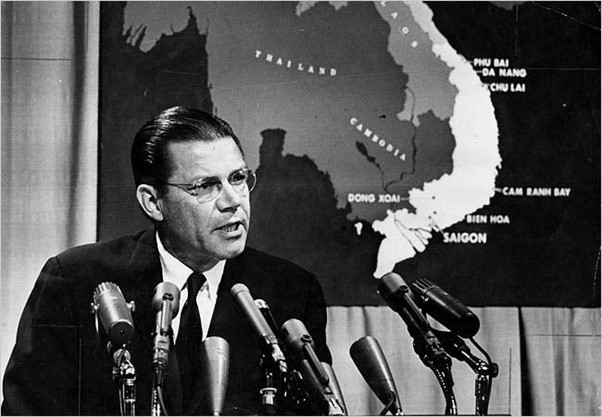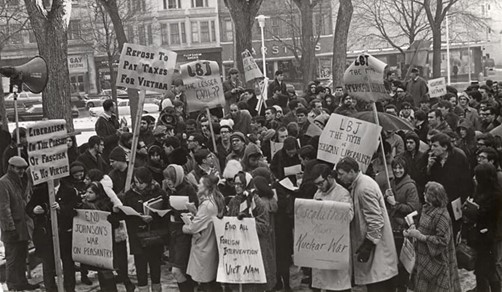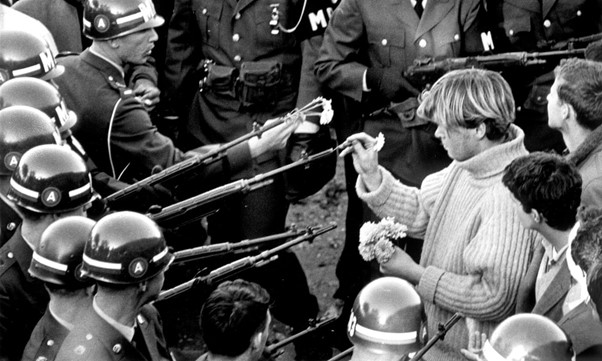If the title for this article sounds familiar, it's because you've heard the (just released) single from John Lennon and Yoko Ono's "bed in". The Beatle and his new bride are living examples of Counter Culture. But just what is "Counter Culture"? Theodore Roszak has thoughts…and Kris has thoughts on those thoughts!

By Mx Kris Vyas-Myall

All fixed, fast-frozen relations, with their train of ancient and venerable prejudices and opinions, are swept away, all new-formed ones become antiquated before they can ossify. All that is solid melts into air, all that is holy is profaned…
The Communist Manifesto, Karl Marx
Your sons and your daughters
Are beyond your command
Your old road is rapidly agin'
Please get out of the new one
If you can't lend your hand
For the times they are a-changin'
The Times They Are A-Changin', Bob Dylan
A spectre is haunting the campuses of the West, the spectre of the counter culture. All the powers of the Technocrats have entered into a holy alliance to exorcise this spectre.
Wait, you may well ask, I thought this was a contemporary review, not a poor pastiche of a 120-year-old piece of political economy? However, this is the central speculation of Theodor Roszak in his latest book: that these are the core oppositional forces of our time.
But what is the Technocratic Society and what is the Counter Culture?
Everything you think, do and say, is in the pill you took today
In the case of the former, Roszak sees Technocracy as the governing by experts from a certain class with the aim of a routinised control over human interaction. This can be observed in our democratic political system where the two main parties in most Western nations usually are not concerned with creating vastly different Utopian systems. More often, it is a competition of seeming the most competent to deliver state run social services, defence and economic growth. Even in the Soviet Union, there is not much talk these days of instituting a worldwide proletarian revolution, compared with speeches on improving the efficiency of grain harvests or increasing housing stocks.

Robert McNamara, Technocrat Extraordinaire
The technocrats themselves are rarely the presidents or prime ministers; they are merely the salesmen. Roszak sees them as the upper-level bureaucrats or the studious quiet men of the cabinets. Robert McNamara is a prime example of this tendency, moving between running Ford Motor Company, the World Bank and the US Defence Department and applying the same philosophy, one he outlined in his recent book, The Essence of Security:
…the real threat to democracy comes, not from overmanagement, but from undermanagement. To undermanage reality is not to keep it free. It is simply to let some other than reason shape reality…Vital decision making, particularly in policy matters. This is partly, though not completely, what the top is for.
You may well ask, what is the problem with this? Well, Roszak outlines the tecnocratic viewpoint thusly:
1. All problems are purely technical in nature, and, therefore, if it is not technical, it cannot be a problem. Depression -> More Pills. Rioting in the cities -> More police.
2. Their end is always the right end and any friction against this is a lack of communication. This can be solved by the Marketplace of Ideas.
3. However, the only people who can truly understand these principles and implement them are this technocratic elite. And, it just so happens, that a good sign that you are one of those qualified to understand these issues is that you are already a part of the governmental or corporate structure.

Want Sexual Promiscuity? Buy A Boat!
And he does not see New Authoritarianism as only occurring in government business but creeping into all aspects of life. Take the example of Playboy, which appears at first to be approving of sexual permissiveness; but, in reality, the articles and photos create an association between sex and wealth for men, whilst reducing women to men’s playthings: making half the population repress themselves whilst striving to reach these elite heights, whilst the other half become accepting of this attitude by the rich and powerful. This viewpoint can be seen again in the trial of Lady Chatterly’s Lover where the argument of the prosecution was:
Is it a book you would even wish your wife or your servants to read?
In fact, Roszak goes further, to state there is a mystification that has happened in the technocracy. Where, in the best Orwellian manner, language is used to obfuscate reality. Where the bombing in Vietnam is referred to as an “escalation” or dictatorial communist regimes refer to themselves as “democratic republics”. If an individual challenges this, the technocrats will merely dismiss them as not understanding the complexity of the issue.
So, what is the solution for this? Well that comes in its opposition.
God is Alive, Magic is Afoot

Allen Ginsberg protesting to legalise marijuana
Counter Culture appears to be derived from the term “contraculture”, defined by Yinger in 1960 as:
wherever the normative system of a group contains, as a primary element, a theme of conflict with the values of the total society, where personality variables are directly involved in the development and maintenance of the group's values, and wherever its norms can be understood only by reference to the relationships of the group to a surrounding dominant culture.
This, though, is almost a decade older and could be seen as merely a standard part of society, like the Bright Young People of the Jazz Age. And the young have usually been the radicals. For example, in 17th Century England, many of the radical protests were led by the London Apprentice Boys, the militant student movement of the day. So what is the difference between the rebellions of yesteryear and the counter culture of today?
The difference is two-fold. First off, the traditional left-right axis does not really create an opposition to technocracy but a support of it. The communist, the fascist and the liberal all accept the need for rational efficiency and control of life by an elite, whether that be the bureaucrat, the camp commandant or the head of a Fortune 500 company. So even the most aggressive of demagogues are no longer opposing the technocracy, merely wishing to be a part of it.

The Disquieting Duckling by Asger Jorn
Secondly, the theories behind the opposition are not predominantly coming down from the elite but up from artists. Early examples include Situationists like Asger Jorn or Beat Poets like Allen Ginsberg, who themselves draw more from the tradition of Blake and Children’s Art than Joyce and Van Gogh. See for example Ginsberg’s Howl:
Moloch whose love is endless oil and stone! Moloch whose soul is electricity and banks! Moloch whose poverty is the specter of genius! Moloch whose fate is a cloud of sexless hydrogen! Moloch whose name is the Mind!

Protest by Students For A Democratic Society
The reason, Roszak claims, this opposition is taking root within the youth movements is also a feature of the technocracy. As the bureaucracy of business has grown bigger and the need for rigid routine labour has diminished, intellectual thought is more valuable among workers. Therefore, experts like Dr. Spock have pushed parents away from regimented childcare towards exploration, and governments have moved children away from the factory floor to longer and longer periods of education. When this kind of student is suddenly ordered to cut his hair and put on a uniform to join the army or the corporation, he naturally rebels against it.
Whilst Roszak acknowledges there is no manifesto of the nebulous group but that what is required is:
…the subversion of the scientific world view, with its entrenched commitment to an egocentric and cerebral mode of consciousness. In its place, there must be a new culture in which the non-intellective capacities of the personalities – those capacities that take fire from visionary splendor and the experience of human communion – become the arbiters of the good, the true and the beautiful.
How will this be achieved? One area Roszack has little time for is the overuse of psychedelics. Whilst he acknowledges they may have use for skilled practitioners:
There is nothing whatever in common between a man of…experience and intellectual discipline sampling mescaline, and a fifteen-year-old tripper whiffing airplane glue.
In fact, he sees the current expansion of psychotropic drugs as having more in common with the technocracy, promising a quick granting of insight that is only superficial and built on a few getting rich whilst causing unhappiness to the many. No different to the barbiturates or alcoholic beverages marketed to the masses.
The actual means for this "subversion" to come about are nebulous. Rather, he sees that this will be developed over time through such concepts as the “Politics of No-Politics” and the de-centralised Utopian thought of Paul Goodman.
The Armies of the Night

Protestors putting flowers in the guns of military police
Roszak goes through a number of different facets of the counter culture and their opposition to the technocratic rationality, from anti-schools to trying to levitate the Pentagon. I have to wonder sometimes if the free-wheeling rejection of rationality extends to his writing. I consider myself reasonably well-read and knowledgeable, but I found myself reaching for dictionaries and other reference material (or just plain scratching my head) trying to understand what he was talking about. He tends to work best in generalities, when he is (to steal a phrase for Kant) critiquing pure reason. When he goes into specifics, such as an entire chapter looking at how Marcuse and Brown attempt to reconcile Marx and Freud, Roszak moves away from insightful investigation to navel-gazing.
He spends some time comparing this movement to nascent Christianity and, by extension, suggesting how this movement over time could change the mode of Western thought. There is one problem I have with this, one he even acknowledges in passing: the fact that people enter and depart with ease and that there are a lot of tourists involved. This is not just the more egregious examples, like Burberry selling expensive imitations of Chinese Communist Army uniforms. Mick Jagger, an LSE drop-out with a public drug bust under his belt seems like the perfect candidate for the Counter Culture. But, whilst he may sing that “the time is right for violent revolution” or “my name is a number, a piece of plastic film”, the group is reportedly planning to tour the US with major venues and able to charge high ticket prices, and he seems just as at home among the accoutrements of wealth as any banker.
Overall, "The Making of a Counter Culture" is interesting as polemic and critique, for, as Roszak puts it:
What is of supreme importance is that each of us should become a person, a whole and integrated person in whom there is manifested a sense of human variety genuinely experienced, a sense of having come to terms with a reality that is awesomely vast.
But as prophecy? That is for the young to show us.
Four Stars

![[July 6, 1969] Everybody's talking about Revolution, Evolution… (The Making of a Counter Culture by Theodore Roszak)](https://galacticjourney.org/wp-content/uploads/2024/06/CC1-261x372.jpg)

